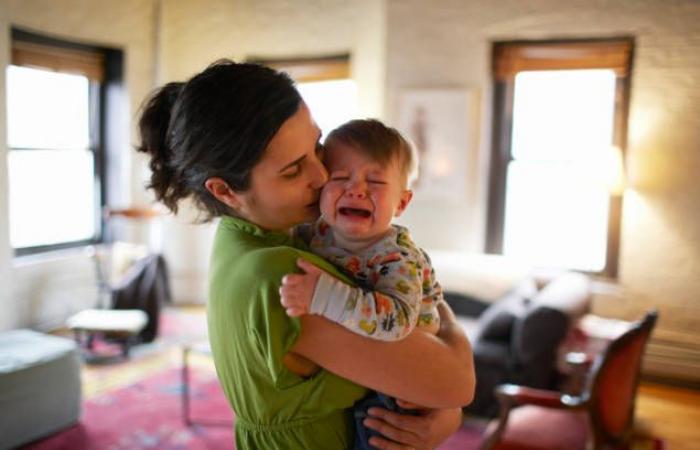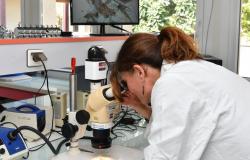Since January, the Federal Office of Public Health (FOPH) and the Federal Commission for Vaccinations (CFV) have recommended vaccination against rotavirus in children under 6 months. This family of viruses, omnipresent in the population and transmissible by simple contact, is the cause of the majority of serious gastroenteritis in infants. Worldwide, this infection, which causes severe diarrhoea and vomiting, is estimated to cause more than 200,000 deaths from dehydration in children under 5 each year.[1] In Switzerland, if deaths remain rare, around 1000 hospitalizations[2] are recorded each year among this young audience.
Babies: 9 actions to adopt in case of gastro
In the event of vomiting and diarrhea linked to viral gastroenteritis, here are some recommendations:
- Offer to drink regularly (bottle of milk and/or water, breastfeeding).
- Split meals into smaller, more frequent portionsin order to avoid significant discharges.
- Favor hearty foods such as carrots, apples, rice, bananas…
- Administer oral rehydration solution (ORS). This powder to be diluted in water, with a sweet-salty taste, helps compensate for losses in water and mineral salts.
- Weigh your child regularly in order to quickly detect possible weight loss.
- Count the number of daily stools and vomitas well as the amount of fluid absorbed in order to inform the doctor if necessary.
- Wash your hands regularly. Especially before meals, after changing or going to the toilet. Also wash your child’s hands, especially if he or she often puts them in his or her mouth.
- Wash surfaces and clothing thoroughly in contact with stools and vomit (toilet, bed linen, underwear, toys, etc.).
- Do not give medications for vomiting and diarrhea without medical recommendation.
New recommendation
In order to prevent these complications, the OFSP and the CFV now recommend vaccination against rotaviruses from 6 weeks and up to 6 months. It is indicated in all babies, regardless of community attendance. “The vaccine is offered very early because babies who have not yet come into contact with the virus are particularly vulnerable,” explains Dr. Alessandro Diana, specialist in vaccinology and lecturer at the Faculty of Medicine at the University of Geneva. . At 2 years old, it is estimated that most children have been in contact with the virus, hence the recommendation for the youngest.”
The first dose is administered between 6 and 15 weeks, and the second before 24 weeks, with a minimum of four weeks between the two doses. Now reimbursed by health insurance funds, this vaccine protects against 90% of the most virulent strains of the virus, therefore limiting the risk of complications linked to dehydration. “Its administration orally, and not by subcutaneous injection, also makes it easier to deliver to the child and also reassures parents,” adds the expert. It is, moreover, very well tolerated most of the time.”
A disease not to be taken lightly
Those of you who have already had the unpleasant experience of gastroenteritis can surely confirm that this disease can be difficult to bear. By causing an inflammatory reaction in the intestinal wall, rotavirus causes abdominal pain, low fever, vomiting and diarrhea. In babies, gastroenteritis can cause severe dehydration, as their small build makes it difficult to replenish water losses. “In the case of vomiting and diarrhea in a baby under 6 months, dehydration is rapid and the body can be impacted within a few hours,” recalls Dr. Diana. It is therefore essential to consult a doctor and implement simple actions to compensate for this water deficit. (read box).
Present in the stomach, rotavirus is transmitted through dirty hands or food contaminated by stools or vomit. For prevention and to limit contamination, careful washing of hands and surfaces is therefore essential, because the virus is resistant for up to several months in the external environment. Symptoms in babies or young children most often disappear spontaneously within 5 to 7 days. If they persist or are accompanied by other disorders (vomiting or stools containing blood, difficulty staying awake, loss of more than 3% of weight, more than 3 liquid stools in a few hours, high fever, etc.), it is necessary to promptly consult a doctor or emergency service.
Childhood vaccination in Switzerland
There are several levels of recommendations issued by the OFSP:
– Basic vaccination, necessary for individual and public health, includes vaccines against diphtheria, tetanus, poliomyelitis, whooping cough, hepatitis B and pneumococci, from 2 months of age. Added to these are vaccinations against measles, mumps and rubella, as well as against chickenpox, at 9 months. Finally, the human papillomavirus vaccine is recommended from 11 years of age.
– Complementary vaccination concerns meningococci (type B and ACWY), as well as rotavirus. “The primary aim of these vaccines is to confer individual protection, unlike basic vaccines for which protection of third parties is sought in addition to individual interest, through high vaccination coverage,” specifies Céline Reymond, door -spokesperson of the OFSP.
________
Published in Le Matin Dimanche on 06/23/2024
[1] Rotavirus: Surveillance standards for vaccine-preventable diseases, WHO, 2018.
[2] Source: Federal Statistical Office (FSO).






